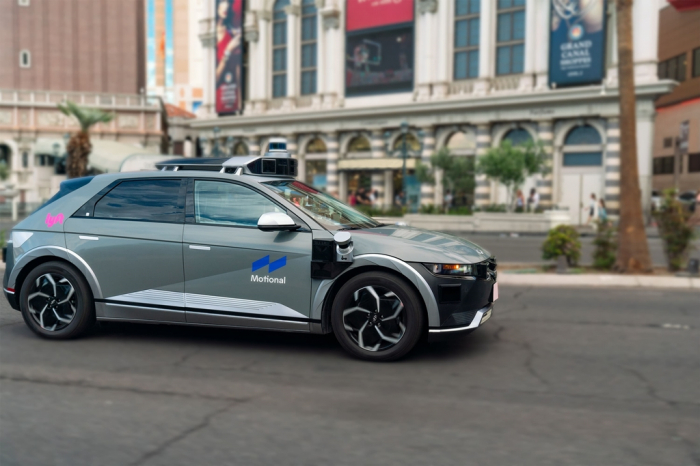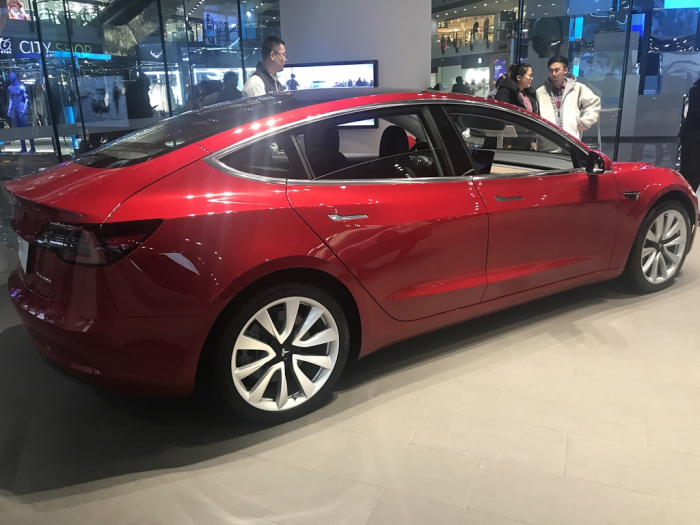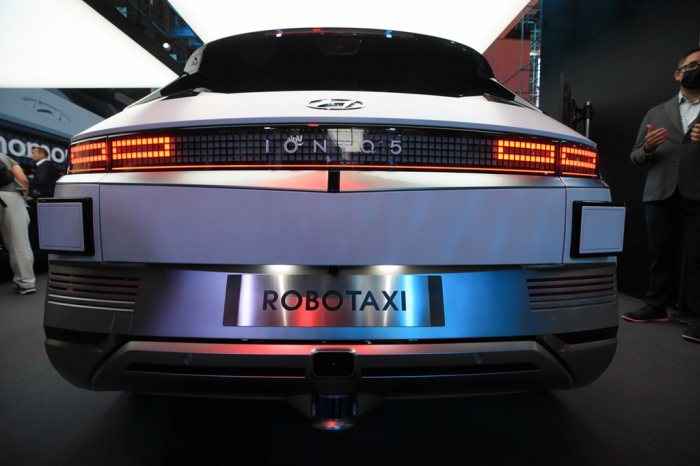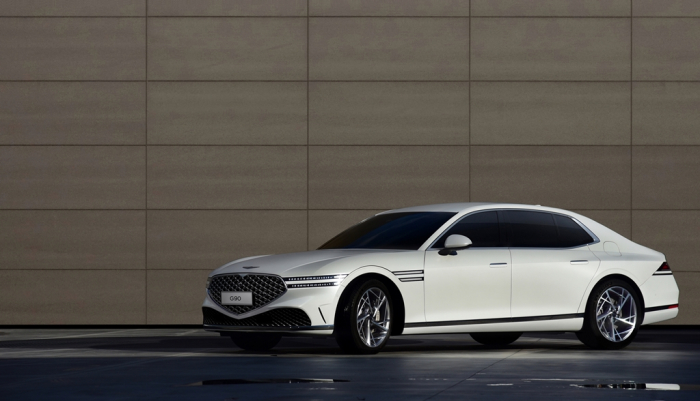Automobiles
Hyundai narrows Level 3 self-driving tech gap with Tesla to one year
Korea's top carmaker aims to overtake Tesla in system computation speeds within the next few years
By Aug 29, 2022 (Gmt+09:00)
4
Min read
Most Read
LG Chem to sell water filter business to Glenwood PE for $692 million


KT&G eyes overseas M&A after rejecting activist fund's offer


Kyobo Life poised to buy Japan’s SBI Group-owned savings bank


StockX in merger talks with Naver’s online reseller Kream


Meritz backs half of ex-manager’s $210 mn hedge fund



South Korea’s top automaker Hyundai Motor Co. has narrowed its technology gap in Level 3 self-driving vehicles with Tesla Inc. to one year, moving a step closer to fully autonomous cars.
The automaking unit of Hyundai Motor Group also said it aims to overtake Tesla in autonomous vehicles’ system computing speeds within the next few years.
At the recent Global Investors Conference hosted by Samsung Securities, Jang Woong-jun, head of Hyundai’s autonomous driving business, said the company’s self-driving technology gap with Tesla, which previously was years behind, has been narrowed to one year.
“Tesla’s advanced driver assistance system (ADAS) is ahead of us. But we’re confident we can overtake Tesla soon,” he said.
Industry officials said it’s the first time Hyundai has publicly mentioned its autonomous driving technology level in direct comparison with Tesla.

MINIMUM HUMAN ENGAGEMENT AT LEVEL 3
Currently, most mass-produced automobiles with self-driving capabilities are based on Level 2 technology of partial driving automation. At Level 2, vehicles with ADAS equipment can take over steering, acceleration and braking in specific scenarios. But the driver must remain alert and is required to actively supervise the technology at all times.
Hyundai’s current Genesis models are equipped with Level 2 driving automation – Highway Driving Assist (HDA).
Level 3, known as conditional driving automation, uses various ADAS equipment and artificial intelligence to make decisions based on changing driving situations around the vehicle. People inside the vehicle do not need to supervise the technology, which means they can engage in other activities, although the driver still needs to be ready to take back control in an emergency.
According to market research firm Navigant Research, half of the new cars will have Level 3 autonomous driving capabilities by 2030.

G90 TO BE HYUNDAI’S FIRST LEVEL 3 CAR
Hyundai plans to launch Level 3 autonomous cars starting with its flagship luxury Genesis G90 sedan later this year, followed by affiliate Kia Corp.’s large-size electric sport utility vehicle, the EV9, next year and Hyundai’s electric SUV IONIQ 7 due in 2024.
The automotive conglomerate aims to roll out fully autonomous driving cars by 2030 after pilot services on real roads in 2023.
The group said the self-driving G90 and EV9 vehicles can travel at up to 80 km an hour on Korean highways, faster than the current limit of 60 km/h.
Through the over-the-air programming (OTA) updates of the software for autonomous driving-related electronics and control devices, the two models will be able to run at 120 km/h, the legally permitted speed limit on Korean expressways.

TESLA 3 DISASSEMBLED
Hyundai has cross-checked its level of autonomous driving technology by disassembling the Tesla Model 3.
According to Hyundai, the Tesla EV has 39 integrated controllers, the brain of autonomous vehicles, compared to 50 for the Hyundai IONIQ 5.
The more such controllers, the higher chances for malfunctions and lower efficiency.
Hyundai said it will reduce the number of integrated controllers in the next-generation IONIQ 5 to four and cut further to three for body control, infotainment, and driving and parking by 2025.
For Hyundai’s third-generation controllers, the domain control unit (DCU) that controls the car body is under development by Hyundai Mobis Co. The driving DCU will be supplied by Halla Group’s autonomous driving solutions subsidiary HL Klemove.
Hyundai AutoEver Co. will manufacture connected car systems and the middleware software that controls the consistent operation of autonomous driving systems and OTA updates.
Hyundai’s Jang said its third-generation integrated controllers will have faster computation speeds than Tesla’s full self-driving (FSD) cars, which boast a speed of 144 trillion operations per second (TOPS).
TO EXPAND SELF-DRIVING BUSINESS STAFF
Hyundai Motor Group plans to raise its autonomous driving business staff to 650 by year-end from the current 600.
It recently acquired 42dot, a Korean autonomous driving startup, and appointed the startup’s Chief Executive Song Chang-hyeon to oversee Hyundai’s mobility development projects.
To prepare for a commercial self-driving service globally, Hyundai and its US mobility joint venture Motional Inc. are testing IONIQ 5 robotaxis on public roads in Las Vegas and other US cities. Hyundai aims to take such services to Singapore and Saudi Arabia later.
Amid a heated race among carmakers and tech firms to develop next-generation autonomous vehicles, Tesla recently said it will raise the price of its FSD suite of cars from $12,000 to $15,000 on Sept. 5.
“Tesla’s autonomous driving system is more expensive than a compact car you see on the road. But if you consider you have hired a driver for the rest of your life, the price is rather low,” said an industry official.
Write to Hyung-Kyu Kim at khk@hankyung.com
In-Soo Nam edited this article.
More to Read
-
 Future mobilityHyundai, Kia to launch Level 3 self-driving Genesis G90, EV9 in 2023
Future mobilityHyundai, Kia to launch Level 3 self-driving Genesis G90, EV9 in 2023Jul 15, 2022 (Gmt+09:00)
3 Min read -
 Future mobilityHyundai’s US partner Aptiv invests in self-driving startup StradVision
Future mobilityHyundai’s US partner Aptiv invests in self-driving startup StradVisionJun 29, 2022 (Gmt+09:00)
2 Min read -
 Future mobilityHyundai’s Motional, Uber to launch self-driving food delivery service
Future mobilityHyundai’s Motional, Uber to launch self-driving food delivery serviceDec 17, 2021 (Gmt+09:00)
2 Min read -
 Future mobilityHyundai’s Chung charts vision as top-tier eco-friendly auto brand
Future mobilityHyundai’s Chung charts vision as top-tier eco-friendly auto brandJan 03, 2022 (Gmt+09:00)
3 Min read
Comment 0
LOG IN


